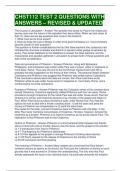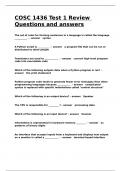CHST112 TEST 2 QUESTIONS WITH
ANSWERS – REVISED & UPDATED
The Council of Jerusalem - Answer-The question that arose on Paul's first missionary
journey was over the nature of the salvation that Jesus offers. When we look closer at
Acts 15, there are two big questions that come to the forefront:
1. What must we do to be saved?
2. Must we keep the Law of Moses in order to be good Christians (i.e. must Christians
become Jewish in their practice)?
The question is further complicated by the fact that false teachers (the Judaizers) had
infiltrated the churches in Galatia and Antioch to spread a false gospel of salvation by
works. Paul writes Galatians to the Galatians to answer the false teachers, and the
missionaries and apostles gathered in Jerusalem to answer both of those questions and
add a third consideration.
Date and provenance of Philemon - Answer-Philemon, along with Ephesians,
Philippians, and Colossians was written while Paul was in prison, either in Caesarea or,
more likely, Rome. Thus near the end of the first Roman imprisonment (AD 59) is
probably the best suggestion for the timing of their writing. The personal details between
Colossians and Philemon may suggest that Philemon was written before Colossians.
If the conclusions above about the date are correct, then Paul most likely wrote
Philemon while he was under house arrest in Caesarea or, more likely, Rome, some
months before he wrote Colossians.
Purpose of Philemon - Answer-Philemon was the Colossian owner of the runaway slave
named Onesimus. Onesimus apparently robbed Philemon and then ran away. Divine
providence brought Onesimus to Paul while Paul was still under house arrest. Paul led
Onesimus to Christ, and Onesimus became a lay minister of the gospel and helper of
Paul. When Paul found out about Onesimus' past, under Roman law, Paul had two
options for how to deal with a known runaway slave: 1) sell the slave and send the
money to Philemon as compensation or 2) send the slave back.
Paul opted for the latter, and sent Onesimus back to Philemon with this letter. In the
letter Paul never mentions manumission of Onesimus. He does, however, demand his
treatment as a brother. Philemon is to receive Onesimus as he would receive Paul. The
implication is that Philemon was to free Onesimus.
Outline of Philemon - Answer-Philemon is a short personal letter between two friends
about a friend who was in trouble. Slavery was the issue, and the gospel is the solution.
vs 1-3 Introduction from Paul to Philemon
vs 4-7 Thanksgiving for Philemon's faithfulness
vs 8-16 Paul appeals to the gospel to change Philemon's thinking about slavery.
vs 17-22 Paul's request for the release of Onesimus to the ministry in Rome
vs 23-25 Conclusion and final greeting
The meaning of Philemon - Answer-Many readers are concerned that Paul doesn't
condemn slavery as openly as he should, but Paul puts the institution of slavery on such
grounds that it was doomed in Christian the understanding. The only time that Paul
directly addresses the issue of an individual slave, he practically demands his freedom.
,1. Salvation is now and has always been by faith. Jews are saved by believing in Jesus
and Gentiles are saved by believing in Jesus.
2. No one is required to keep the Law of Moses in order to be a good Christian.
3. Jews and Gentiles should both be careful that their behavior does not offend the
other.
How to read an epistle - Answer-1. The letters in the New Testament are a combination
of personal correspondence, public letter, and theological treatise.
2. The personal components tell us about the early church and give us principles for
Christian living.
3. The public components instruct the church on how to live as the people of God in this
age.
4. The treatise components provide the church with both sound theology and its
application.
5. We must always carefully and precisely move from particular situations to universal
application.
Authorship of Galatians - Answer-The author of Galatians is Paul the apostle. His name
appears in the "from line" in the letter itself, and the text reflects Pauline language,
concerns, and structure. Much of Galatians is, in fact, autobiographical for the
missionary apostle.
Date of Galatians - Answer-Scholars debate the date of the writing of Galatians
(scholars debate everything!), but the best evidence indicates that Paul wrote Galatians
very early, just after he returned from his first missionary journey and before the
gathering of all the apostles, pastors, and missionaries in Jerusalem to deal with the
"Judaizer" heresy around AD 48-49. ***In bible modern day turkey is Asia minor.***
Provenance of Galatians - Answer-If the conclusions above about the date are correct,
then Paul most likely wrote Galatians from
Antioch, Jerusalem, or somewhere on the road between.
Purpose of Galatians - Answer-While Paul and crew were traveling through Asia Minor
on their first missionary journey, the
church began encountering the "Judaizers," a heretical Jewish Christian sect that taught
a different gospel than what Paul taught. They are described in Acts 15:1.
1 But some men came down from Judea and were teaching the brothers, "Unless you
are circumcised according to the custom of Moses, you cannot be saved."
In Galatians Paul describes the Judaizers as preachers of a different gospel who trouble
the church and distort the truth (Gal 1:6-7). Before Paul led the church in dealing with
this heresy (Acts 15), he had to combat it on the mission field from which he had just
returned. After Paul left, the Judaizers moved into Galatia and the Galatians were
persuaded by them. Galatians is Paul's appeal to those Christians to return to the true
gospel of Jesus and the doctrine of justification by faith.
The bad guys in Galatians - Answer-1) They were a Christian sect.
2) They taught that keeping laws were how we were made right before God.
3) They taught Jewish exclusivity.
4) They challenged Paul's apostleship.
, Outline of Galatians - Answer-In Galatians Paul does two things. He begins by directly
attacking the Judaizers and their false gospel, and then he concludes by appealing to
the Galatians that they might live their lives in the Spirit and not by works of the flesh.
I. Rebuke of the False Gospel
Chapters 1-2: Autobiography and Defense of Apostleship
Chapters 3-4: Theological Defense of Justification by Faith
II. Appeal to Pursue Life in the Spirit
Chapters 5-6: Practical Results of Justification by Faith
Galatians Chapter by Chapter - Answer-Chapter 1 - Paul appeals to the Galatians to
cling to the true Gospel of Jesus.
1-5: Introduction
6-10: There is only one gospel of Jesus.
11-24: Paul's testimony about himself
Chapter 2 - Paul defends his apostleship and tells of his confrontation with Peter.
1-10: Paul meets the other apostles; circumcision is the big issue.
11-14: Paul confronts Peter.
15-21: Paul explains the gospel of "grace through faith."
Chapter 3 - Paul teaches the doctrine of justification and uses Abraham as his focus.
1-14: Salvation has always been by grace through faith.
15-29: The difference between the law of God and the grace of God
Chapter 4 - Paul demonstrates from the Old Testament that the doctrine of justification
is not a new creation of his.
1-7: The purpose of the law
8-20 : Paul defends himself.
21-31: Paul uses another Old Testament example to make his point.
Chapter 5 - Paul argues that we have freedom from sin and freedom from the law in
Christ.
1-15: If Christ has set us free, then why live by works?
16-26: How Christians ought then to live
Chapter 6 - Paul admonishes the church that to live in the Spirit means to care for one
another in community.
1-10: Some practical examples of Christian living
11-18: Paul's final word and warning
Acts Chapter by Chapter - Answer-Chapter 1 - The ascension of Christ into Heaven
Chapter 2 - The coming of the Holy Spirit and Peter's first sermon
Chapter 3 - Healing the lame man at the temple and Peter's second sermon
Chapter 4 - Peter and John arrested
Chapter 5 - Ananias and Sapphira and their lie
Chapter 6 - Selecting the first seven deacons
Chapter 7 - The stoning of Stephen
Chapter 8 - Phillip with Simon and the Eunuch
Chapter 9 - The conversion of Saul
Chapter 10 - Cornelius' Conversion
Chapter 11 - Peter defends God's grace and the gentile mission.
Chapter 12-14 - The first missionary journey
Chapter 15 - The Council of Jerusalem
Chapter 16-18 - The second missionary journey
Chapter 18-20 - The third missionary journey
Chapter 21 - Paul returns to Jerusalem and is arrested.





